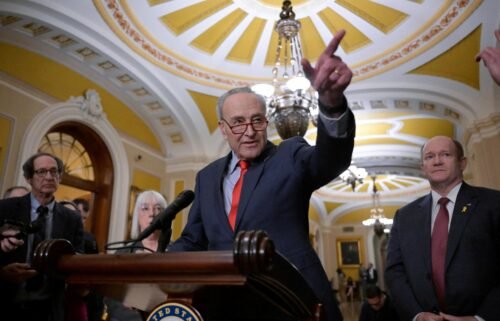Why the infrastructure deal *really* matters to Joe Biden
Analysis by Chris Cillizza, CNN Editor-at-large
When Joe Biden would talk on the 2020 campaign trail about the need to rekindle bipartisanship in Washington and his unique ability derived from decades in the Senate to make it happen, there were lots of eye rolls.
It felt to many (myself included) like a bit of nostalgia on Biden’s part, nostalgia based on a fundamental misunderstanding of How Politics Works, or, more accurately, doesn’t work. Maybe in the 1970s bipartisanship was possible, we all said. But that was 50 years ago.
Then Biden proved us wrong.
The announcement on Thursday that he and a group of senators — five Democrats and five Republicans — had agreed to the framework of an infrastructure package that totals more $1.2 trillion over eight years, with $559 billion in new spending, was the proof that Biden had long promised that bipartisanship is not, in fact, dead.
“Neither side got everything they wanted in this deal,” Biden said in remarks delivered Thursday afternoon. “That’s what it means to compromise.”
The bipartisan compromise on infrastructure is, to borrow a famous/infamous Biden-ism, a “big [expletive] deal” for his presidency.
After securing quick approval of a $2 trillion coronavirus stimulus package aimed at revivifying the economy following the devastation wrought by 16 months of Covid-19 forced lockdowns, Biden’s domestic agenda had hit a slow patch. Efforts to cut a deal on police reform had bogged down. A united front of Senate Republicans had blocked both the creation of an independent commission to study the January 6 US Capitol riot and the “For the People” Act.
When infrastructure talks between Biden and Republican Sen. Shelley Moore Capito broke off without a deal earlier this month, it appeared as though his bipartisan boasts on the campaign trail were simply out of reach. That he had badly miscalculated the desire for compromise among his former Senate colleagues as well as his own persuasive ability to make deals possible.
But Biden, unbowed by the failure with Capito, immediately jumped into a new set of talks with the bipartisan group of 10 senators who had been working on their own compromise infrastructure proposal.
His willingness to do so brought criticism — particularly from the left, many of whom insisted this was all nothing more than a stalling tactic by Senate Republicans who, at the end of the day, had zero interest in making a deal that would deliver Biden a major first-term victory.
“Dems are burning precious time & impact negotiating w/GOP who won’t even vote for a Jan 6 commission,” tweeted New York Rep. Alexandria Ocasio-Cortez earlier this month. “McConnell’s plan is to run out the clock. It’s a hustle. We need to move now.”
Biden’s stubbornness to just keep grinding away at a bipartisan deal in the face of that skepticism and criticism from some of the most prominent voices in his party is what ultimately led to the agreement announced Thursday.
Which, as I said above, is a clear victory for Biden — and his first-term agenda. And there’s no question that his political advisers are leaping for joy behind the scenes right now. He said he could make deals and he did! Promises made and promises kept! And all that. Biden nodded to that political reality at various points; “Today is a huge day for one-half of my economic agenda, the American Jobs Plan,” he said at one moment.
That said, if you listen to how the President talked about the deal on Thursday, it’s quite clear that he was motivated by a desire to prove — to himself and to the rest of the country — that we can come together and that, when we do, the end result is better for everyone.
The deal “reflects something important,” Biden said toward the end of his prepared remarks. “It reflects consensus. The heart of democracy requires consensus.”
This deal “signals to ourselves and to the world that American democracy can deliver,” he added. “Because of that, it represents an important step forward for our country.”
Speaking in such sweeping terms makes clear just how critical Biden feels the infrastructure deal is. It isn’t just a compromise to spend trillions to fix the country’s crumbing roads and bridges. And it’s not even just that the compromise represents, in his words, “breaking the ice that for too long has kept us frozen in place.”
The deal is about even more than that, in Biden’s imagining. It’s about who we are as people — and as a country. That we have more that unites us than divides us. That we are, at root, able to compromise on things that really matter to us. And that the compromise, once reached, makes all of us stronger.
The deal, in short, represents for Biden a rejection of the last four years of “President Donald Trump.” Trump spent his entire four-year term working to weaponize the differences between Americans. In Trump’s vision, the country — and the world — was divided between people who agreed with him and everyone else. The former group was lavished with praise and goodies; the latter was punished at every opportunity.
The Biden pitch on the campaign trail against Trump in 2020 was, put simply, that we are better than this guy thinks we are.
That’s why getting this bipartisan deal means so much more than pure political gains for Biden: It’s a reaffirmation of his fundamentally optimistic view of human nature.
The-CNN-Wire
™ & © 2021 Cable News Network, Inc., a WarnerMedia Company. All rights reserved.

